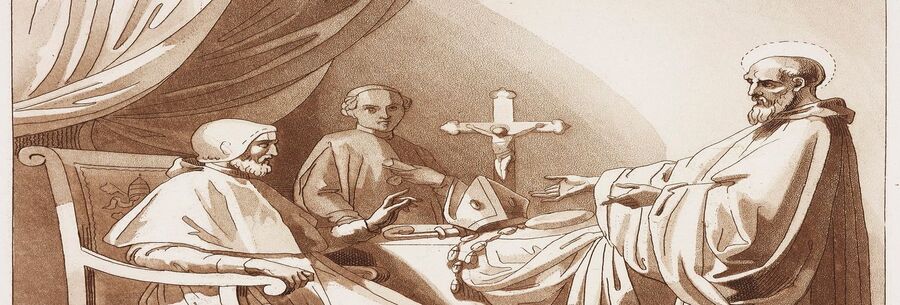Peter Damian, also known as Saint Peter Damian, was one of the most eminent figures of the Catholic Church in the 11th century. Born in 1007 in Ravenna, Italy, he entered monastic life at an early age, marking the beginning of a life devoted to prayer, contemplation and service to the Church.
His monastic life began at the Benedictine monastery of Fonte Avellana, where he embraced the rigour of the Benedictine rule. There, Peter Damian immersed himself in monastic discipline, seeking to draw closer to God through prayer, fasting and meditation. His exemplary commitment and zeal for monastic life were soon noticed, and he was elected abbot of the monastery in 1043.
Pierre Damien was also an eminent scholar, mastering the works of the Church Fathers and engaging in in-depth studies of theology and spirituality. His intellectual contribution to the Church was crucial, and he was often called upon to serve as a theological and spiritual adviser.
However, one of St Peter Damien's most outstanding contributions to the history of the Church was his role in the reform of the clergy in the 11th century. At a time when the Church was facing challenges related to simony (the selling of ecclesiastical offices) and priestly celibacy, Peter Damian made a strong commitment to radical reform.
His correspondence with the pontiffs of his day, including Popes Leo IX and Nicholas II, reflects his ardour in denouncing abuses and his advocacy of the purity of ecclesiastical life. His writings, such as "Liber Gomorrhianus", openly denounce the vices within the clergy and call for the need for moral reform.
Recognised for his asceticism, piety and courage, Saint Peter Damian was created Cardinal-Bishop of Ostia in 1057. Despite his ecclesiastical responsibilities, he continued to lead a simple and austere life. His influence extended far beyond the borders of his monastery, reaching far-flung regions of Europe.
St Peter Damian died on 21 February 1072, leaving behind him a lasting spiritual and intellectual legacy. His exemplary monastic life, his contribution to the reforms of the Church and his commitment to truth and justice make him a revered figure in Christian history. Canonised in 1828 by Pope Leo XII, Saint Peter Damien remains a model of holiness, integrity and courage for future generations.




















